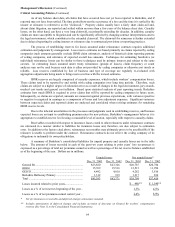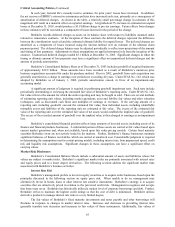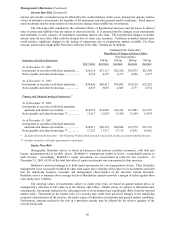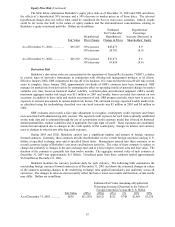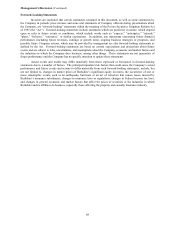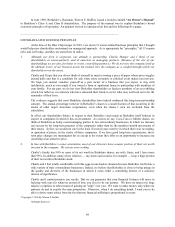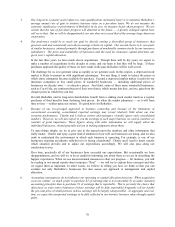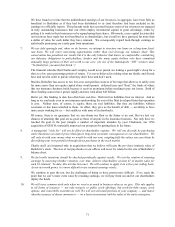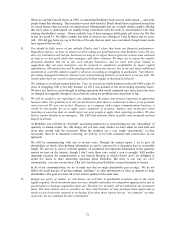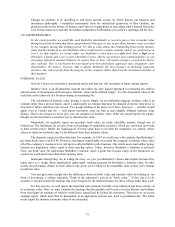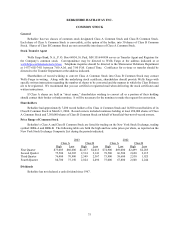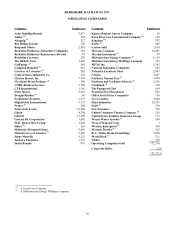Berkshire Hathaway 2003 Annual Report Download - page 75
Download and view the complete annual report
Please find page 75 of the 2003 Berkshire Hathaway annual report below. You can navigate through the pages in the report by either clicking on the pages listed below, or by using the keyword search tool below to find specific information within the annual report.74
Some graduates will find that the book value of their education exceeds its intrinsic value, which means
that whoever paid for the education didn’ t get his money’ s worth. In other cases, the intrinsic value of an education
will far exceed its book value, a result that proves capital was wisely deployed. In all cases, what is clear is that
book value is meaningless as an indicator of intrinsic value.
THE MANAGING OF BERKSHIRE
I think it’ s appropriate that I conclude with a discussion of Berkshire’ s management, today and in the
future. As our first owner-related principle tells you, Charlie and I are the managing partners of Berkshire. But we
subcontract all of the heavy lifting in this business to the managers of our subsidiaries. In fact, we delegate almost to
the point of abdication: Though Berkshire has about 172,000 employees, only 16 of these are at headquarters.
Charlie and I mainly attend to capital allocation and the care and feeding of our key managers. Most of
these managers are happiest when they are left alone to run their businesses, and that is customarily just how we
leave them. That puts them in charge of all operating decisions and of dispatching the excess cash they generate to
headquarters. By sending it to us, they don’ t get diverted by the various enticements that would come their way
were they responsible for deploying the cash their businesses throw off. Furthermore, Charlie and I are exposed to a
much wider range of possibilities for investing these funds than any of our managers could find in his or her own
industry.
Most of our managers are independently wealthy, and it’ s therefore up to us to create a climate that
encourages them to choose working with Berkshire over golfing or fishing. This leaves us needing to treat them
fairly and in the manner that we would wish to be treated if our positions were reversed.
As for the allocation of capital, that’ s an activity both Charlie and I enjoy and in which we have acquired
some useful experience. In a general sense, grey hair doesn’ t hurt on this playing field: You don’ t need good hand-
eye coordination or well-toned muscles to push money around (thank heavens). As long as our minds continue to
function effectively, Charlie and I can keep on doing our jobs pretty much as we have in the past.
On my death, Berkshire’ s ownership picture will change but not in a disruptive way: None of my stock
will have to be sold to take care of bequests and taxes; all of it will go to my wife, Susan, if she survives me, or to a
family foundation if she doesn’ t. In either event, Berkshire will possess a controlling shareholder guided by the
same philosophy and objectives that now set our course.
At that juncture, the Buffett family will not be involved in managing the business, only in picking and
overseeing the managers who do. Just who those managers will be, of course, depends on the date of my death. But
I can anticipate what the management structure will be: Essentially my job will be split into two parts, with one
executive becoming responsible for investments and another, who will be CEO, for operations. If the acquisition of
new businesses is in prospect, the two will cooperate in making the decisions needed. Both executives will report to
a board of directors who will be responsive to the controlling shareholder, whose interests will in turn be aligned
with yours.
Were we to need the management structure I have just described on an immediate basis, our directors know
who I would recommend for both posts. All candidates currently work for Berkshire and are people in whom I have
total confidence.
I will continue to keep the directors posted on the succession issue. Since Berkshire stock will make up
virtually my entire estate and will account for a similar portion of the assets of either my wife or the foundation for a
considerable period after my death, you can be sure that I have thought through the succession question carefully.
You can be equally sure that the principles we have employed to date in running Berkshire will continue to guide
the managers who succeed me.
Lest we end on a morbid note, I also want to assure you that I have never felt better. I love running
Berkshire, and if enjoying life promotes longevity, Methuselah’ s record is in jeopardy.
Warren E. Buffett
Chairman


